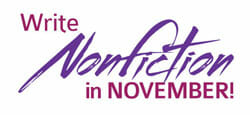| by Nina Amir (@NinaAmir) You may not know this but Nina—whose last post here was How to Test Market Your Book Idea with a Blog—is also the founder of National Nonfiction Writing Month, which brings the opportunity of writing a book in 30 days to nonfiction writers at the same time each year that millions of aspiring fiction writers are engaged in National Novel Writing Month (NaNoWriMo). It's all starting in a few days, so Nina is here to tell you that yes, it's possible to write a book in 30 days. (And don't miss the notice below the post about the promotions that we'll be running for NaNoWriMo on the BookDesignTemplates.com site.) Here's Nina's article.
Actually it is. Whether you choose to take part in National Novel Writing Month (NaNoWriMo) or in National Nonfiction Writing Month (NaNonFiWriMo), also known as the Write Nonfiction in November (WNFIN) Challenge, truth be told, you can produce a good book in a month. However, I contend that doing so takes a good bit of planning prior to the beginning of November as well as some tenacity. Plotters vs. SeatsersIn the world of fiction, there's a debate between the plotters and seatsers about the best, or maybe the most creative, way to write a book. One group likes to plot out their ideas before they write; the other group likes to write by the seat of their pants—to just let the book unfold as they write. Nonfiction writers aren't much different. Just as many like to create a solid table of contents or outline for a book prior to writing a word as prefer to sit down and begin writing with no set plan for how they will get from point A to point B; they just know they will get there in the end. Book PlanningIf you want to write a full-length book, or even a short ebook, in 30 days, however, you'll do so more quickly and easily—or lets say efficiently and effectively—if you've done some book planning. By this I mean actually brainstorming your idea or story line, fiction or nonfiction, until you can create a table of contents.
I suggest going so far as to produce chapter summaries or chapter-by-chapter synopsis. This helps you know exactly what you will cover in each and every chapter. If you don't want to write these in detail, create a bulleted list of items or scenes you plan to include in each chapter. Business PlanningTo produce a really good book in 30 days, you also must conduct two types of business planning before you begin: market and competition. A good book is directed at a specific market, or group of people you think will be most likely to purchase your book. First, determine who those people are, and if there are enough of them to make writing your book a viable project. Once you've identified your market, you can decide if you need to re-angle your idea or story to their needs, desires and interests. If the book is not one they will want to purchase, it won't sell. That means it won't get read. So, how good will your book really be if it doesn't have readers? Second, to help you produce a good book in 30 days determine if the book you want to write is different from those books already published in the same category. Look at books that directly compete with yours, or that are written about the same subject matter or that tell a very similar story. These books represent your competition. This takes a bit of time, so set aside a day or two when you can "look inside" books virtually on Amazon or take a trip to your local bookstore. Study these books' table of contents, back cover copy, and first chapter or two. Do you propose to write a better book? Will your book be unique compared to the others in your category? Be sure you can answer "yes" to these questions. If not, determine how to change your idea, your story, or the structure of your book so it is unique and necessary in both the bookstore category and the market you plan to target. |


 With this done, if you flesh out your table of contents further you'll be prepared to write quickly and easily during the course of the month, which means you will, more likely, turn out a good book efficiently and effectively.
With this done, if you flesh out your table of contents further you'll be prepared to write quickly and easily during the course of the month, which means you will, more likely, turn out a good book efficiently and effectively. 




